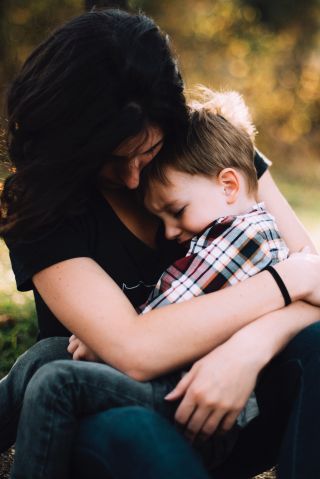Parenting
Atrocities: What Can Young Children Handle?
How to support your young child at a time of heightened media coverage.
Posted October 16, 2023 Reviewed by Monica Vilhauer
Key points
- Children under 10 are much more vulnerable than adults when faced with news of atrocities.
- Parents and other adults should protect young children from too much media exposure to the horrific details.
- The same principles apply to the Holocaust, Indian Residential Schools, and the Middle East situation.

Adults throughout the world are shocked and horrified by the inconceivable atrocities committed by Hamas terrorists in Israel on October 7, 2023, and the devastation that has continued each day since then. Children are far more vulnerable than adults, so it’s understandable that child development experts are advising parents and others to protect young children from what’s happening in the Middle East.
Atrocity Teaching Shouldn’t Start Until Age Eight or Ten
Dr. Jamie Howard directs the Stress and Resilience Program at the Child Mind Institute in New York. She recommends that children under ten be shielded from the details of Hamas’ invasion of Israel. Howard has explained on CBS, PBS, and other news outlets that children under ten are not developmentally ready to cope with the harrowing details that are emerging from the war.
Similarly, Holocaust education experts recommend not starting to teach about the horrors of the Holocaust until the age of eight, when it can begin in generalities rather than specifics. When a child under 10 hears about specific instances of cruelty, abuse, and violence against other children, it can trigger their own fears and insecurities, especially if the child is sensitive and imaginative and/or has had prior exposure to violence or abuse.
Many adults are triggered by media exposure to atrocities, so it should not be surprising to learn that young children don’t yet have the emotional maturity to cope with horrific details and put them into historical perspective. An overdose of stress undermines a child’s health and well-being physically, cognitively, and psychologically, now and into the future. This can result in impaired cognitive and emotional functioning, behavior problems, and other serious issues well into adulthood.
What If Your Young Child Asks?
It’s always important to take children’s questions seriously and answer them honestly, but in the case of a young child who asks about child rapes, murders, and dismemberments, that can be very tricky.
- Take good care of yourself. Your child is highly sensitive to your emotional well-being. If you’re in a state of heightened agitation, it’s time to pull together your coping resources and support system so you can be strong for yourself and your child.
- Monitor your child’s consumption of information and media reports. Use your judgement about what your child can handle. They may be fine with factual reports, but have persistent nightmares about video footage.
- Be calm and reassuring. When with your child, emphasize your commitment to keeping them safe.
- Start with what your child thinks is happening. If your child asks you about the situation, ask them what they’ve heard about it. Follow their lead, and don’t introduce new details.
- Clarify misconceptions. Your young child may see the danger as more local and imminent than it is, more likely to happen to them and their loved ones. Address and clarify any misconceptions they might have.
- Keep your comments short and simple. This is not the time for a lesson in history or global politics. That can wait until your child gets a bit older.
- Stick to the normal routines. Your young child finds comfort and security when things are stable and predictable at home.
- Find a medium for positive-directed creative self-expression. One of the best ways for a young child to work through complicated feelings is through painting, music, or other vehicles of creative self-expression.
- Look for ways your child can help. Talk to your child about what you can do together about the situation. Maybe you can get involved in raising money for relief or victim support. You can pray together if that makes sense in your family, or spend a few minutes each day sending positive thoughts to those affected by the horrors.
- Talk about your family values. You or your child can be completely derailed by tragedy, or you can see it as an opportunity to affirm your deepest values, including resilience, courage, and compassion.
The Same Principles Apply to Past Atrocities
The need for parents to make wise decisions applies not only to the current atrocities in Israel and Gaza, but also to historic atrocities such as the Holocaust and Indian Residential Schools. I have encountered the slogan “Old enough to go, old enough to know,” suggesting that children of five and six are old enough to learn what happened at residential schools because children of that age were kidnapped and abused. These schools did incalculable harm to the children, leaving generations of damage in their wake. Surely, we don’t want to traumatize today’s kids because kids of their age were traumatized in years past.
Young children are sensitive, vulnerable, and imaginative. They need the adults in their lives to protect them until they have the emotional maturity to cope safely with learning about atrocity.
References
The Origins of You: How Childhood Shapes Later Life, by Jay Belsky, Avshalom Caspi, Terrie Moffit, and Richie Moulton.
“Childhood exposure to violence and lifelong health: Clinical intervention science and stress-biology research join forces,” by Terrie Moffit and The Klaus-Grawe 2012 Think Tank.


